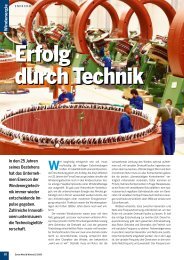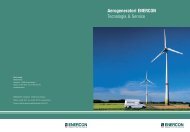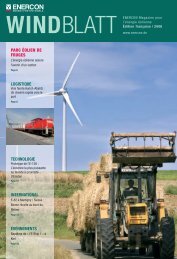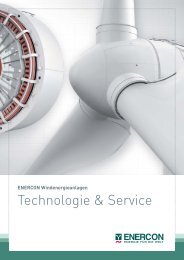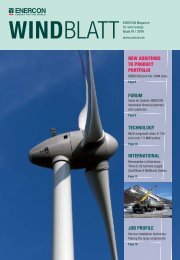Download - Enercon
Download - Enercon
Download - Enercon
Create successful ePaper yourself
Turn your PDF publications into a flip-book with our unique Google optimized e-Paper software.
EDITORIAL WINDBLATT 04 | 2008 3<br />
Dear Readers,<br />
More and more people come to recognise that the future belongs to renewable energies. Even<br />
the International Energy Agency (IEA), whose forecasts for many years stayed well behind the<br />
actual developments, has now urged countries worldwide to increase their efforts to promote<br />
regenerative energies. When it comes to fulfilling the main IEA criteria for an efficient growth<br />
of electricity generation from renewable sources, fixed power purchase price systems have<br />
proven to be most effective. This is because they address a number of key issues: Transparency<br />
and reliability of promotion frameworks; incentives for investments that use degressive<br />
models and support specific technologies; and the removal of other, non-economic impediments.<br />
Consequently, the IEA confirmed Portugal, Spain, and Germany as the most effective<br />
promoters of renewable energies through their power purchase price system.<br />
As a result, these states are already well on the way towards a sustainable energy supply model<br />
for the future. Even in its worst-case scenario for the increase of renewable electricity generation<br />
by the year 2020, the German Ministry for the Environment calculates a 30 % share<br />
of renewables – while expecting fewer investments in land-based wind energy. The nine<br />
coal-fired power plants currently under construction would thus be sufficient to ensure a continuous<br />
power supply in Germany. There is no need for additional fossil power stations. And<br />
why should we even assume that investments in onshore wind energy will drop? The wind<br />
industry in particular plays a pioneering role in the development of grid-supporting technology,<br />
as well as in energy storage research. In response to the core challenges, wind<br />
energy can already provide answers now that will stand the test of time. It would therefore be<br />
wrong to scale back investments in land-based wind energy that has until now been key to<br />
the expansion of renewables.<br />
The European Parliament, too, has recognised the importance of fixed power purchase price<br />
systems for the continued expansion of the renewable energies sector and has made sure that<br />
national power purchase systems are not being jeopardised by harmonised certificates<br />
trading. Instead, the draft guideline currently with the European Council changes the political<br />
framework beyond just promotion systems: According to the parliament’s plans, renewable<br />
energies will receive EU-wide priority access to the grid for feeding in power; proceeds from<br />
the auctioning of emission trading certificates will in part be used for renewable energies<br />
research; and the milestones on the way to the 20 % mark become binding for the member<br />
states. These improvements are urgently needed to ensure a sustainable, future-oriented<br />
energy supply model in the European Union.<br />
Yours sincerely<br />
Aloys Wobben<br />
Managing Director ENERCON GmbH



![[PDF] WB 02-2013 deu web - Enercon](https://img.yumpu.com/23394578/1/190x253/pdf-wb-02-2013-deu-web-enercon.jpg?quality=85)
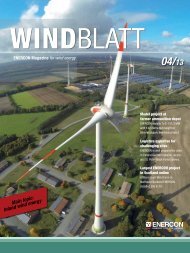

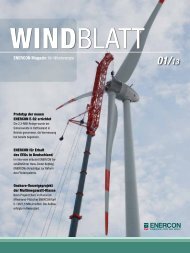
![[PDF] WB 04-2013 deu web - Enercon](https://img.yumpu.com/22304561/1/190x253/pdf-wb-04-2013-deu-web-enercon.jpg?quality=85)
